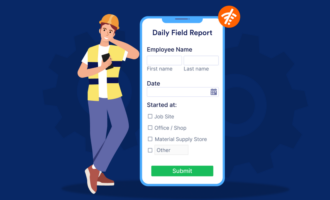Field data is information companies collect outside of the workplace. The field can be anywhere employees conduct work or interact with customers.
From service technicians to real estate agents, field data is essential both to understanding the customer experience and gaining insight into organizational strengths and weaknesses. Here’s a look at the benefits of field data collection and why having access to high-quality, digestible data can transform your business.
Evaluate customer satisfaction
One of the greatest benefits of field data is the ability to glean insight into the customer experience. Since executives and managers don’t normally see how their employees connect with customers, collecting data on these interactions can shine a light on what’s working well and what needs improvement.
For example, consider a heating and cooling company that has technicians working out in the field daily. By providing the customer with a quick satisfaction survey via phone or tablet, the technician can get real-time feedback and send it directly to company stakeholders. This survey could ask questions about communication between the customer and field technician, and whether or not the job met or exceeded their expectations.
This data can be aggregated to understand where customers are most satisfied, and where there’s room for improvement.
Evaluate employee performance
You can also use field data to evaluate employee performance. Specifically, companies can implement daily surveys that field technicians complete themselves. The surveys can collect mission-critical information such as the number of sales, upsells, and new customers. The data gives insight into employee productivity, says Jackie Carney at Business2Community.
“Enthusiastic, productive employees will complete projects on time and on budget, and will positively engage with customers throughout the entire process,” Carney explains. “Employees who are inefficient or sloppy in their work can cost a business both money and its reputation.”
In addition to providing insight on how each employee is performing over time, such surveys can demonstrate employee strengths. While one employee might be skilled at upselling new customers, another might be better at fostering meaningful connections with existing customers.
Proper field data collection enables companies to better understand who should be in what position, so that they can optimize the workforce.

Identify extra costs and expenses
Companies that can identify and eliminate additional costs gain a competitive edge. This is one of the greatest benefits of field data collection. For example, you might collect data regarding where workers travel, how much revenue they bring in, and how much it costs to travel to certain locations.
You can also look at the geography of your travel network to see which areas bring in the most revenue for the least up-front cost. This helps you see if servicing certain locations actually costs more than it’s worth and where you should focus your energy.
Collecting this information digitally helps you create reports based on each location in real time. As a result, you can make strategic changes over the course of weeks and months, rather than waiting for year-end reports.
Identify workflow challenges and improvements
Field data collection offers insight into your processes and workflows so you can identify issues that are preventing optimal performance. One way you can do this is by equipping employees with mobile surveys that require input every step of the way. These forms can capture details like what time something was delivered, how long it took to install new equipment, and how much it costs to drive home.
These details can add up to decreased efficiency and wasted time and money. That’s why it’s so important to first understand what’s happening in daily operations. Once you do that, you can analyze this real-time data to identify issues. After you’ve identified areas of improvement, company managers can work to remedy them through employee training, technology investments, and changes to processes.

Obtain accessible, actionable data
Field data collection is essential for providing companies with the data they need to improve, grow, and move forward.
Customizable data-collection tools allow field managers to add detailed data fields. Examples include geolocation, imagery, and length of customer interaction. These forms can easily be edited and changed depending on the company’s needs. This means that field workers can use forms personalized according to their skills and job description.
Mobile forms can also include a mix of multiple-choice and long answer questions, which can help save time and improve the accuracy of the data collected.
All of this information is sent to managers, where it can be put to use immediately. Access to weekly reporting helps both managers and field workers operate at optimum efficiency to boost the company’s bottom line.
Mobile data collection enables your field service team members to gather more data in remote locations, interact with customers in more intuitive ways, and avoid tedious paperwork and duplicate data entry. Companies that use field data to power their decisions save money and time while helping field workers become more efficient and productive.












Send Comment: